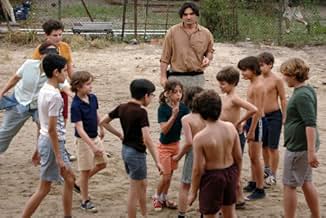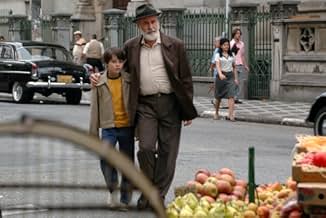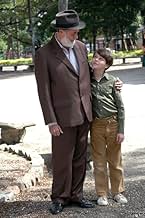CALIFICACIÓN DE IMDb
7.3/10
6.8 k
TU CALIFICACIÓN
Agrega una trama en tu idiomaA boy is left alone in a Jewish neighborhood in 1970, when the World Cup coincides with political crackdowns by the military dictatorship.A boy is left alone in a Jewish neighborhood in 1970, when the World Cup coincides with political crackdowns by the military dictatorship.A boy is left alone in a Jewish neighborhood in 1970, when the World Cup coincides with political crackdowns by the military dictatorship.
- Dirección
- Guionistas
- Elenco
- Premios
- 32 premios ganados y 38 nominaciones en total
Opiniones destacadas
The premise appears simple, but that's only on surface. Suddenly, the country is divided between the euphoria of the 1970 World Cup (in which Brazil was champion for the third time) and the anguish of the dictatorship. That could be good material for biting social critique, but the movie takes a radically different path. It follows the life of a kid, whose parents are leaving for "vacations". He's left at his grandfather's apartment, only to find out that he died hours before his arrival. Finding himself in the unnatural environment of a Jewish community, having no news about his parents and having to live with a grumpy old man, he finds comfort in football and everything that deals with it.
Fans of the hyperactivity and non-linearity of City Of God will have to expect a completely different style here. While there are flashes of comedy and quirkiness, the movie is very focused and delicately paced. There isn't a lot that can be told here, really, and I won't go on spoiling the story. Check it out for yourself, if only to witness the clashing contrast between two opposite realities in a way no history book could deliver.
Fans of the hyperactivity and non-linearity of City Of God will have to expect a completely different style here. While there are flashes of comedy and quirkiness, the movie is very focused and delicately paced. There isn't a lot that can be told here, really, and I won't go on spoiling the story. Check it out for yourself, if only to witness the clashing contrast between two opposite realities in a way no history book could deliver.
In 1970, near the World Cup, Daniel Stern (Eduardo Moreira) and his wife Miriam (Simone Spoladore) leaves Belo Horizonte in a hurry and scared with their ten years old son Mauro (Michel Joelsas) in their Volkswagen. While traveling to São Paulo, the couple explains Mauro that they will travel on vacation and will leave Mauro with his grandfather Mótel (Paulo Autran). Daniel promises to return before the first game of the Brazilian National Soccer Team in the Cup. The boy is left in Bom Retiro, a Jewish and Italian neighborhood, and waits for Mótel in front of his apartment. When the next door neighbor Shlomo (Germano Haiut) arrives, he tells the boy that Mótel had just had a heart attack and died. Alone and without knowing where his parents are, the boy is lodged by Shlomo and the Jewish community. Through the young neighbor Hanna (Daniela Piepszyk), Mauro makes new friends, cheers for the Brazilian team and sees the movement of the police and militaries on the streets while waiting for his parents.
In 1970, 90 millions of Brazilians were cheering for the National Soccer Team in the World Cup while the dictatorship had the toughest and cruelest moment against the opposition. I found this touching and sensitive movie amazing, since the director Cao Hamburger was able to brilliantly work with amateurish children and achieve outstanding performances, exposing the political situation of that milestone of Brazilian contemporary history through the eyes of a middle-class boy of ten years old. For me, it is absolutely impressive because I had approximately the same age of Mauro in 1970 and I lived that moment going to school, playing soccer and buttons, going to the beach and to the movie theater and cheering for our National Soccer Team without knowing or understanding clearly what was happening. The story is very simple and dramatic, but never corny, and the very convincing performances of the cast is awesome and touching. Michel Joelsas and Daniela Piepszyk have key roles in the story and I dare to write that two stars are born. My vote is ten.
Title (Brazil): "Ano em Que Meus Pais Saíram de Férias, O" ("The Year When My Parents Went on Vacation")
In 1970, 90 millions of Brazilians were cheering for the National Soccer Team in the World Cup while the dictatorship had the toughest and cruelest moment against the opposition. I found this touching and sensitive movie amazing, since the director Cao Hamburger was able to brilliantly work with amateurish children and achieve outstanding performances, exposing the political situation of that milestone of Brazilian contemporary history through the eyes of a middle-class boy of ten years old. For me, it is absolutely impressive because I had approximately the same age of Mauro in 1970 and I lived that moment going to school, playing soccer and buttons, going to the beach and to the movie theater and cheering for our National Soccer Team without knowing or understanding clearly what was happening. The story is very simple and dramatic, but never corny, and the very convincing performances of the cast is awesome and touching. Michel Joelsas and Daniela Piepszyk have key roles in the story and I dare to write that two stars are born. My vote is ten.
Title (Brazil): "Ano em Que Meus Pais Saíram de Férias, O" ("The Year When My Parents Went on Vacation")
O ano em que meus pais sairam de férias is Cão Hamburger's rather spectacular debút into the area of feature-length films for adult audiences.
Set mostly in the São Paulo neighborhood of Bom Retiro during the 1970 World Cup (and also, not coincidentally, during the "Iron Years" of the last Brazilian military dictatorship), the film tells the story of Mauro (Michel Joelsas), a boy from the state of Minas Gerais who is dropped off in front of the São Paulo apartment of his Jewish grandfather when his parents are forced to hide from the political police. When Mauro arrives, he finds that his grandfather has recently passed away and Mauro is left virtually alone as he waits out his parents' "vacation". In the process, the boy forms an alternative family consisting of the orthodox Jewish immigrant community of his grandfather, a group of neighborhood children including Hanna (spectacularly played by Daniela Piepszyk) and the attractive anarchist Ítalo (Caio Blat). Bom Retiro also discovers Mauro: this son of political activists is Jewish only in heritage and is much more interested in football than anything else.
Indeed, in Hamburger's world, football is the one uniting aspect of Brazilian society. From the apolitical orthodox rabbis to the black goalie on the Jewish football team to the Italians to the anti-dictatorship guerrillas, the one thing that unites everyone is the game. In a São Paulo that is usually defined by its immigrants and work ethic, everything stops for World Cup games and neighborhood matches. In this way, the film is not so much the story of youth in the dictatorship (as is the case with the Chilean Machuca and the Argentine Kamchatka) but rather a story set in that time and a circumstance created by the dictatorship. Instead, it is Hamburger's attempt to describe Brazilian society through the lens of what is, on the surface, the most unusual of Brazilian settings: one of the Jewish neighborhoods of São Paulo. In this world, people of many races, ethnicities and religions mix, united by football even as they are divided by culture. Another factor that unites them is that nearly all of the characters are not particularly tied to politics or concerned with the dictatorship. Indeed, like most people across classes, these characters are much more concerned with providing for their families and even improving their situations. Fighting the political situation becomes a sort of fringe activity that is the "luxury" of youths like Ítalo and ultimately the folly of "responsible adults" like Mauro's parents. It is not that Hamburger advocates this stance but rather that he sees the historical truth that few actively fought against the dictatorship while the great majority silently tried to ignore ituntil it invaded their own lives. As such, the film is a quiet tragedy.
Visually, the film is quite lovely thanks to the cinematography of Adriano Goldman. Shot mostly with small hand-held cameras in close quarters, the film has an intimacy and silence that is intense without being cheesy. Lit in tones of blues and greens and seamlessly edited by Daniel Rezende (Motorcycle Diaries, City of God), it is almost surprisingly well-made for such a "small" film. Finally, it is worth noting that Hamburger did an excellent job casting and working with the youthful and largely inexperienced actors.
Set mostly in the São Paulo neighborhood of Bom Retiro during the 1970 World Cup (and also, not coincidentally, during the "Iron Years" of the last Brazilian military dictatorship), the film tells the story of Mauro (Michel Joelsas), a boy from the state of Minas Gerais who is dropped off in front of the São Paulo apartment of his Jewish grandfather when his parents are forced to hide from the political police. When Mauro arrives, he finds that his grandfather has recently passed away and Mauro is left virtually alone as he waits out his parents' "vacation". In the process, the boy forms an alternative family consisting of the orthodox Jewish immigrant community of his grandfather, a group of neighborhood children including Hanna (spectacularly played by Daniela Piepszyk) and the attractive anarchist Ítalo (Caio Blat). Bom Retiro also discovers Mauro: this son of political activists is Jewish only in heritage and is much more interested in football than anything else.
Indeed, in Hamburger's world, football is the one uniting aspect of Brazilian society. From the apolitical orthodox rabbis to the black goalie on the Jewish football team to the Italians to the anti-dictatorship guerrillas, the one thing that unites everyone is the game. In a São Paulo that is usually defined by its immigrants and work ethic, everything stops for World Cup games and neighborhood matches. In this way, the film is not so much the story of youth in the dictatorship (as is the case with the Chilean Machuca and the Argentine Kamchatka) but rather a story set in that time and a circumstance created by the dictatorship. Instead, it is Hamburger's attempt to describe Brazilian society through the lens of what is, on the surface, the most unusual of Brazilian settings: one of the Jewish neighborhoods of São Paulo. In this world, people of many races, ethnicities and religions mix, united by football even as they are divided by culture. Another factor that unites them is that nearly all of the characters are not particularly tied to politics or concerned with the dictatorship. Indeed, like most people across classes, these characters are much more concerned with providing for their families and even improving their situations. Fighting the political situation becomes a sort of fringe activity that is the "luxury" of youths like Ítalo and ultimately the folly of "responsible adults" like Mauro's parents. It is not that Hamburger advocates this stance but rather that he sees the historical truth that few actively fought against the dictatorship while the great majority silently tried to ignore ituntil it invaded their own lives. As such, the film is a quiet tragedy.
Visually, the film is quite lovely thanks to the cinematography of Adriano Goldman. Shot mostly with small hand-held cameras in close quarters, the film has an intimacy and silence that is intense without being cheesy. Lit in tones of blues and greens and seamlessly edited by Daniel Rezende (Motorcycle Diaries, City of God), it is almost surprisingly well-made for such a "small" film. Finally, it is worth noting that Hamburger did an excellent job casting and working with the youthful and largely inexperienced actors.
Coming of age tales seem to be old fashioned, perhaps because we've already got so many of these stories that they all seem the same. "Amarcord" (perhaps the least conventional coming of age film ever made - but what would you expect from Federico Fellini's reminiscences?), "Pelle, the Conqueror", "My Life as a Dog", "Summer of '42" and "Radio Days", just to name a few, are unforgettable films. Naturally, these stories tend to repeat old clichés, but every now and then we get a fresh and sincere coming of age film, even if it's not innovative or particularly original. "O Ano em que Meus Pais Saíram de Férias" aka "The Year My Parents Went on Vacation" is one of those. It's not in the same level as the gems I mentioned, but it's delicate and touching.
Brazil, 1970: military dictatorship haunts the nation, and 12 year-old Mauro (Michel Joelsas) is sent to live in São Paulo with his grandfather (Paulo Autran), when his parents go "on vacation". While he waits for his parents to come back, Mauro roots for Brazil to win the FIFA World Cup for the third time. The movie resembles two good recent flicks, "Kamchatka" (Argentina, 2002) and "The Miracle of Bern" (Germany, 2003), in the way it has dictatorship and soccer at the core of their stories. Without being a masterpiece, "O Ano em que Meus Pais Saíram de Férias" is a nostalgic piece about an important time in Brazilian history. Besides, it was Paulo Autran's (one of, if not THE, greatest Brazilian actors of all time) last movie - an extra reason to check it. 8/10.
Brazil, 1970: military dictatorship haunts the nation, and 12 year-old Mauro (Michel Joelsas) is sent to live in São Paulo with his grandfather (Paulo Autran), when his parents go "on vacation". While he waits for his parents to come back, Mauro roots for Brazil to win the FIFA World Cup for the third time. The movie resembles two good recent flicks, "Kamchatka" (Argentina, 2002) and "The Miracle of Bern" (Germany, 2003), in the way it has dictatorship and soccer at the core of their stories. Without being a masterpiece, "O Ano em que Meus Pais Saíram de Férias" is a nostalgic piece about an important time in Brazilian history. Besides, it was Paulo Autran's (one of, if not THE, greatest Brazilian actors of all time) last movie - an extra reason to check it. 8/10.
An absolutely beautiful film. We cried and we laughed. The boy is so cute and charming, but he still acted like a man when he had to. I'm telling all my friends about this little gem of a film. The political setup is based on very real events in Brazil at the same time that the international soccer star, Pele, was given an almost godlike stature in that country. The way the filmmakers manage to weave the political story, the personal story - of a boy waiting to be reunited with his parents - and the cultural "shock" of discovering the boy's Jewish roots was outstanding and very moving for me. I think this is a little gem, a masterpiece that will be enjoyed for years to come, like a Cinema Paradiso.
¿Sabías que…?
- TriviaBrazil's Official Submission to the Best Foreign Language Film Category of the 80th Annual Academy Awards. The film was one of the nine films that made it to the January's short list but failed to secure the nomination.
- ErroresWhen Mauro arrives in São Paulo, he looks out to the car window noticing the tall buildings - the known Banespa Tower (now Farol Santander) and the Marchetti building, located in the city's downtown. Not only it's a shot on reverse but completely unpractical to the place he and his parents were going - Bom Retiro is located below downtown - and the particular area they were going, shot from right to the left, is completely off traffic since it's an one-way street that only moves from left to right.
- ConexionesFeatured in Por Dentro do Filme 'O Ano em que Meus Pais Saíram de Férias' (2006)
Selecciones populares
Inicia sesión para calificar y agrega a la lista de videos para obtener recomendaciones personalizadas
Detalles
- Fecha de lanzamiento
- País de origen
- Idiomas
- También se conoce como
- The Year My Parents Went on Vacation
- Locaciones de filmación
- Productoras
- Ver más créditos de la compañía en IMDbPro
Taquilla
- Presupuesto
- BRL 3,000,000 (estimado)
- Total en EE. UU. y Canadá
- USD 807,117
- Fin de semana de estreno en EE. UU. y Canadá
- USD 80,655
- 17 feb 2008
- Total a nivel mundial
- USD 3,218,370
- Tiempo de ejecución1 hora 50 minutos
- Color
- Mezcla de sonido
- Relación de aspecto
- 1.85 : 1
Contribuir a esta página
Sugiere una edición o agrega el contenido que falta

Principales brechas de datos
By what name was O Ano em que Meus Pais Saíram de Férias (2006) officially released in India in English?
Responda































